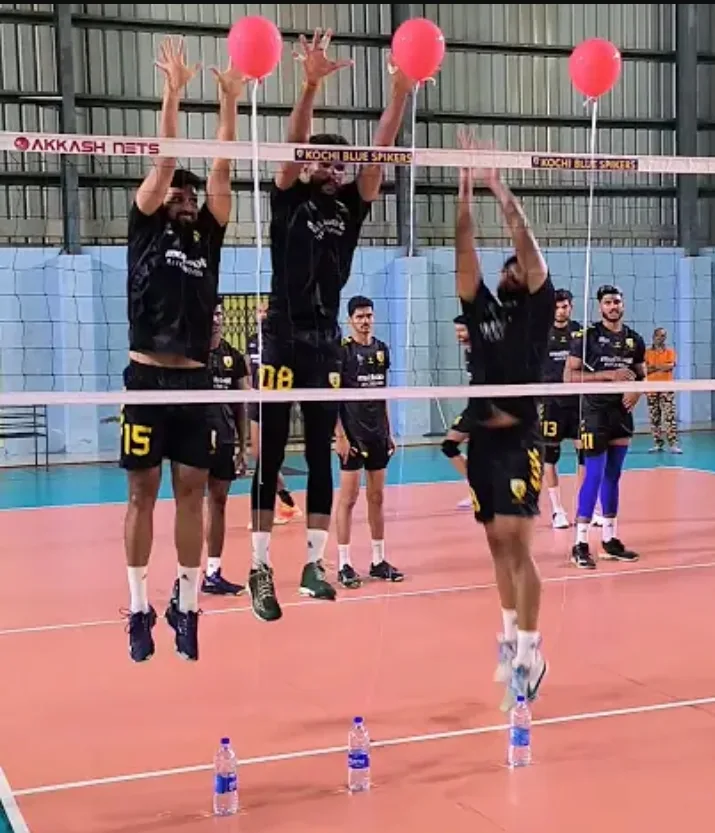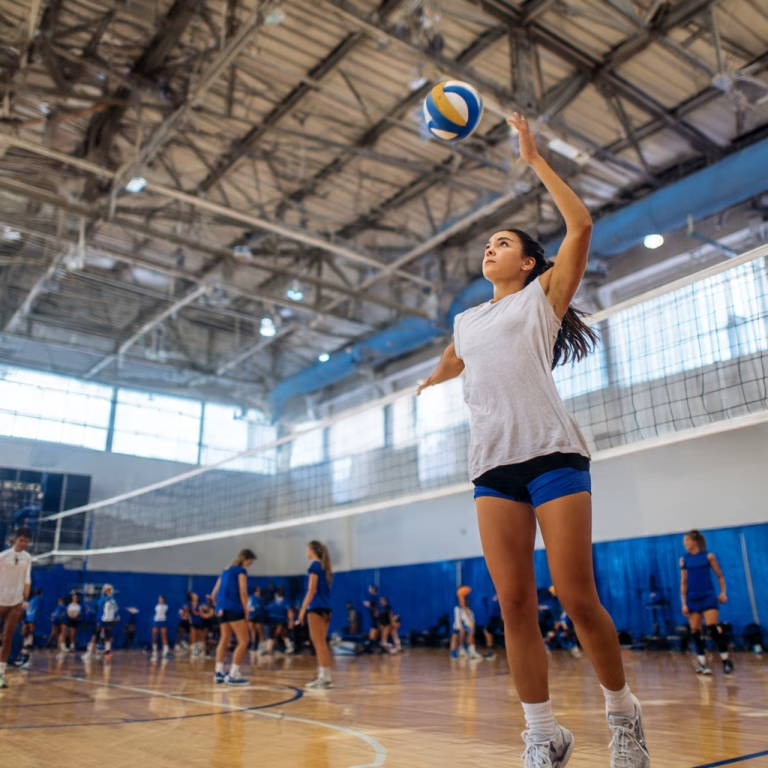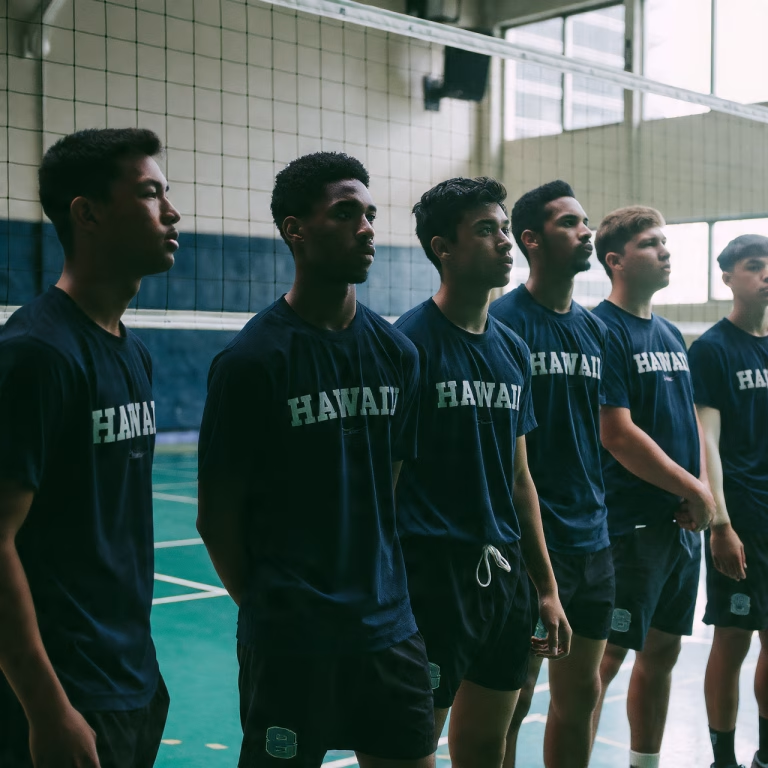It’s very common for aspiring volleyball players to ask questions like, “What is the average work environment for pro volleyball players? Well, for professional volleyball players, the work environment is more than just the court.
Pro volleyball players work environment encompasses training facilities, travel schedules, team dynamics, and the physical and mental challenges of the sport.
Understanding what a pro volleyball player’s work environment looks like will give you insights into their day-to-day lives, especially for aspiring athletes and fans who want to become pros someday.
In this article, we’ll look at the average work environment for professional volleyball players, including training routines, team setups, competition demands, and the balance between work and life.
What to expect in this article?
- The Daily Routine of a Pro Volleyball Player
- Pro Volleyball Players Training and Competition
- Team Dynamics and Work Relationships
- Travel and Its Impact on Pro Volleyball Players
- Physical and Mental Challenges in the Work Environment
- Balancing Professional and Personal Life, and so on
What Is the Average Work Environment for Pro Volleyball Players?
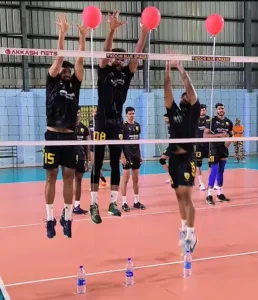
A professional volleyball player’s day is meticulously planned. Professional volleyball players often work in a dynamic and demanding environment. Their schedule includes intense training sessions, competitive matches in large arenas, and frequent travel to different locations. The lifestyle requires a strong commitment to physical fitness and teamwork, as players must perform at their best under pressure.
The work environment also involves managing a tight schedule, balancing practices, games, and recovery. Pro volleyball players often spend time with their teammates, building trust and coordination both on and off the court. This career demands discipline, focus, and adaptability to thrive in a competitive setting.
Each day in a professional volleyball player’s life revolves around balancing training, recovery, and personal time. Here’s what a typical average work environment for a pro volleyball player might look like:
| Time | Activity |
| 6:00 AM – 7:00 AM | Morning stretching and light exercises |
| 7:00 AM – 8:00 AM | Breakfast with a focus on nutrition |
| 9:00 AM – 12:00 PM | Training session: drills, scrimmages, tactics |
| 12:30 PM – 1:30 PM | Lunch and rest |
| 2:00 PM – 3:30 PM | Strength training or cardio exercises |
| 4:00 PM – 6:00 PM | Review game footage or team strategy. |
| 6:30 PM – 7:30 PM | Dinner |
| 8:00 PM – 9:00 PM | Recovery activities: massage, ice baths |
| 9:30 PM | Sleep preparation and relaxation |
This is just a predictable schedule. Remember that schedules may vary depending on match days and other activities around them. But in all schedules, the emphasis on discipline and routine will always remain constant.
Read more: How Much Does a Professional Volleyball Player Make
Where Do Pro Volleyball Players Train and Compete?
- Training Facilities
Professional volleyball players train in state-of-the-art facilities equipped with:
- Regulation-sized courts for practice and tactical sessions.
- Weight rooms for strength and conditioning.
- Recovery centers with saunas, ice baths, and physiotherapy services.
- Competition Venues
Pro volleyball matches are played in different volleyball environments, including:
- Indoor Volleyball: Stadiums with large seating capacities.
- Beach Volleyball: Outdoor courts on sand. Usually played on sand with two or four players on each team.
- Outdoor Volleyball: Played on grass or sand with six players on each team.
- Competitive Volleyball: Played at the high school, college, or professional level.
- Blind Volleyball: Played by professional players who are blind or have low vision.
- Deaf Volleyball: Played by professional players who are deaf or hard of hearing.
Volleyball venues, whether outdoor or indoor, are designed to accommodate fans while maintaining optimal conditions for players.
Team Role and Work Relationships
Professional volleyball is a team sport that thrives on collaboration. Here’s how the team environment shapes a player’s experience:
- Roles Within the Team
Everyone in the volleyball game has a role; while some are playing on the court, others engage in off-scene activities that ensure the safety and well-being of the players.
- Coaches: If you are a team coach, then you have to provide guidance, tactics, and feedback.
- Teammates: For teammates, they have to build camaraderie and trust with each other on and off the court.
- Support Staff: The trainers, nutritionists, and physiotherapists roles ensure the players are in good and healthy conditions for peak performance.
- Communication and Team Culture
Players are inculcated with clear communication and mutual respect practices. These are crucial in professional volleyball teams. Players often bond through team-building activities, shared goals, and post-match celebrations.
See Also: Top 10 Highest Paid Volleyball Players in the World (2024 update)
Travel and Its Impact on Pro Volleyball Players
Professional volleyball players travel more often than a normal person. These travels could have a positive or negative impact on them.
- Frequent Travel
Professional volleyball players travel extensively for tournaments, league matches, and training camps. Domestic leagues may involve short flights or road trips, while international competitions require long-haul flights and adapting to different time zones.
- Travel Challenges
Travel can disrupt routines and pose challenges like:
- Fatigue from jet lag.
- Limited access to preferred training facilities.
- Adjusting to unfamiliar environments and climates.
As a result of these challenges, professional players usually develop strategies to maintain their performance, such as proper hydration, stretching during flights, and maintaining consistent sleep patterns.
See Also: 5 Best Budget Volleyball Shoes
Physical and Mental Challenges in the Work Environment
Professional volleyball players could face both physical and mental challenges in the work environment due to physical or mental stress.
- Physical Demands
Professional volleyball is physically intense. Players face:
- Injuries: Common issues include ankle sprains, shoulder strains, and knee injuries.
- High Performance: Maintaining peak fitness levels requires rigorous training and recovery protocols.
- Mental Challenges
- Pressure to Perform: Expectations from fans, sponsors, and teams can be overwhelming.
- Dealing with Loss: Coping with defeat and staying motivated is crucial.
- Balancing Focus and Relaxation: Staying mentally sharp without burning out is an ongoing challenge.
To handle these challenges, most professional volleyball players often work with sports psychologists to strengthen their mental strength and toughness.
See Also: How Long Are Volleyball Games?
Balancing Professional and Personal Life
Maintaining a work-life balance can be challenging for professional volleyball players. Here’s how they manage:
- Time Management
- Players often have limited personal time during the season but make the most of off-season breaks.
- Scheduling calls and visits with family helps maintain connections during busy periods.
- Hobbies and Interests
- Many players pursue hobbies like reading, cooking, or playing instruments to unwind.
- Social media platforms are also a popular way for players to engage with fans and share glimpses of their lives.
See Also: Top Volleyball Quotes to Inspire and Motivate Players
FAQs
How many hours do pro volleyball players train daily?
On average, pro volleyball players train 4-6 hours a day, split between technical practice and physical conditioning.
What do pro volleyball players eat to stay fit?
Their diet includes lean proteins, complex carbs, healthy fats, and plenty of fruits and vegetables. Hydration is also key.
Do pro volleyball players have an off-season?
Yes, most players have an off-season, which they use for rest, recovery, and personal activities.
How do pro volleyball players deal with injuries?
Players follow tailored rehabilitation plans designed by physiotherapists and gradually return to play under medical supervision.
What’s the hardest part of being a professional volleyball player?
Balancing the physical and mental demands of the sport while maintaining a personal life is often cited as the most challenging aspect.
Get your volleyball shoes today!
Conclusion
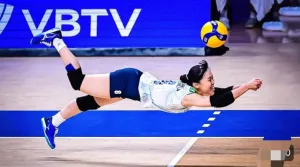
The work environment of professional volleyball players is demanding yet rewarding. Their activities range from rigorous training and constant travel to engaging in competitions.
See Also: Famous female volleyball players: 20 most popular female players
Whether you’re aspiring to become a professional volleyball player or simply curious about the sport, understanding the realities of professional volleyball will give you enough insights into why you should appreciate their hard work and dedication.

